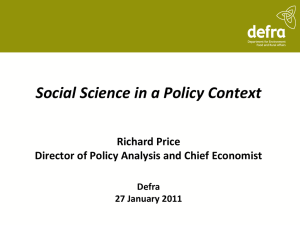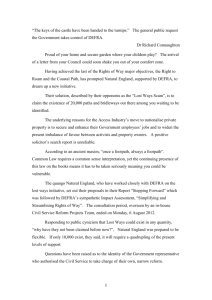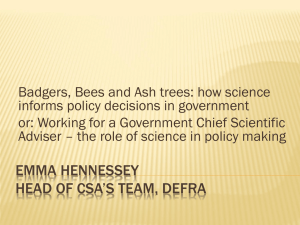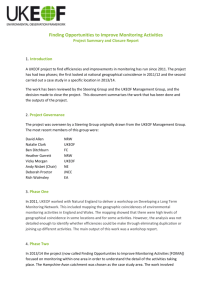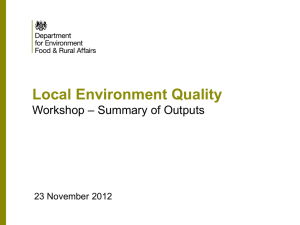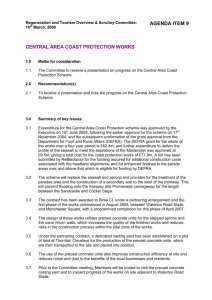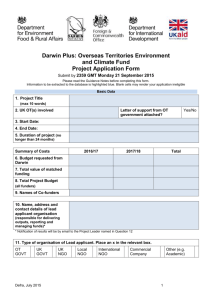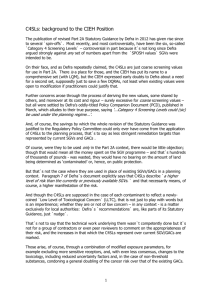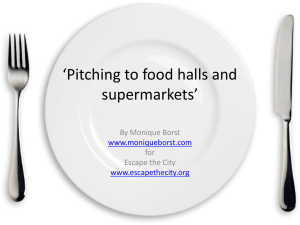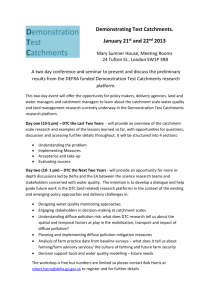Minutes - All-Party Parliamentary Group on Science & Technology in
advertisement
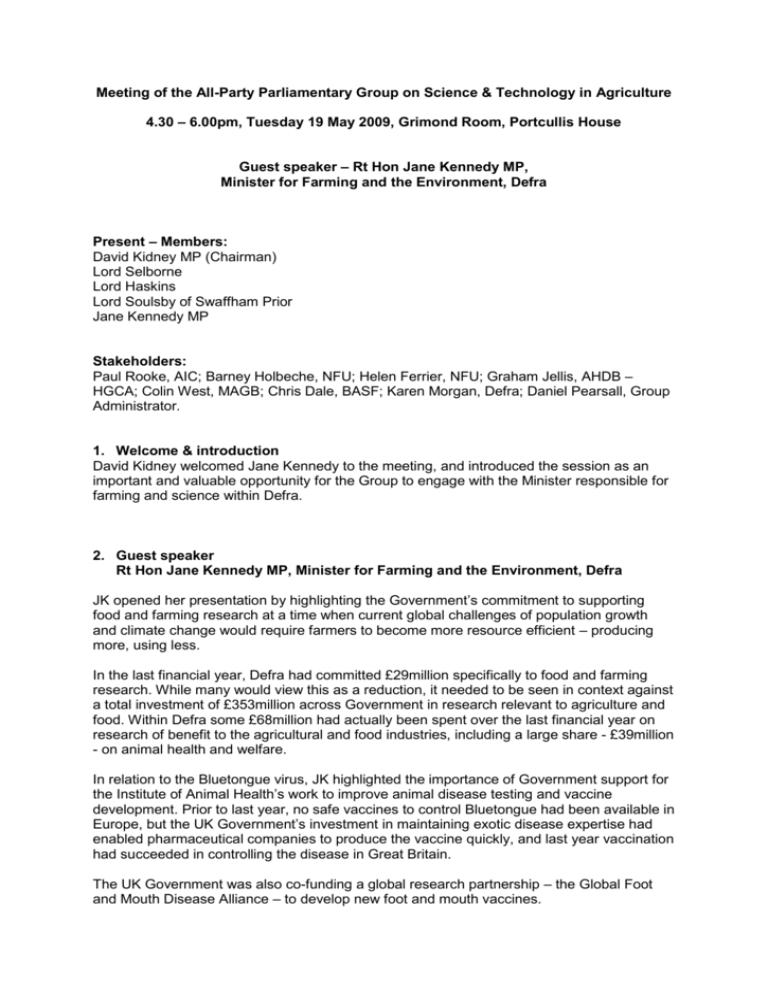
Meeting of the All-Party Parliamentary Group on Science & Technology in Agriculture 4.30 – 6.00pm, Tuesday 19 May 2009, Grimond Room, Portcullis House Guest speaker – Rt Hon Jane Kennedy MP, Minister for Farming and the Environment, Defra Present – Members: David Kidney MP (Chairman) Lord Selborne Lord Haskins Lord Soulsby of Swaffham Prior Jane Kennedy MP Stakeholders: Paul Rooke, AIC; Barney Holbeche, NFU; Helen Ferrier, NFU; Graham Jellis, AHDB – HGCA; Colin West, MAGB; Chris Dale, BASF; Karen Morgan, Defra; Daniel Pearsall, Group Administrator. 1. Welcome & introduction David Kidney welcomed Jane Kennedy to the meeting, and introduced the session as an important and valuable opportunity for the Group to engage with the Minister responsible for farming and science within Defra. 2. Guest speaker Rt Hon Jane Kennedy MP, Minister for Farming and the Environment, Defra JK opened her presentation by highlighting the Government’s commitment to supporting food and farming research at a time when current global challenges of population growth and climate change would require farmers to become more resource efficient – producing more, using less. In the last financial year, Defra had committed £29million specifically to food and farming research. While many would view this as a reduction, it needed to be seen in context against a total investment of £353million across Government in research relevant to agriculture and food. Within Defra some £68million had actually been spent over the last financial year on research of benefit to the agricultural and food industries, including a large share - £39million - on animal health and welfare. In relation to the Bluetongue virus, JK highlighted the importance of Government support for the Institute of Animal Health’s work to improve animal disease testing and vaccine development. Prior to last year, no safe vaccines to control Bluetongue had been available in Europe, but the UK Government’s investment in maintaining exotic disease expertise had enabled pharmaceutical companies to produce the vaccine quickly, and last year vaccination had succeeded in controlling the disease in Great Britain. The UK Government was also co-funding a global research partnership – the Global Foot and Mouth Disease Alliance – to develop new foot and mouth vaccines. Last year, the UK Government spent over £7million on a wide-ranging TB research programme, including work to develop more rapid diagnostic tests and identify practical husbandry methods to reduce the risk of badger-cattle contact on farm. £20million would be spent on vaccine research and development over the next three years to develop usable vaccines against TB. But JK insisted that funding alone was not the answer – research projects also needed to be effectively prioritised. Defra’s new Food and Environment Research Agency, announced by JK in February, would play a key role in ensuring the Government’s agricultural research programme was focused on helping farmers adapt to climate change and safeguard resources. With most productive farmland at or just above sea-level, balancing the need to maximise farm output while addressing the effects of climate change was a major issue. JK indicated that this was why Defra’s strategy for investment in scientific evidence was currently under review. Investments had to be cost effective, and take account of existing knowledge across Government departments and within the wider scientific community. The Government’s forthcoming Climate Projections, for example, would be based on the best available science, offering detailed information about some of the extreme weather events we would face in the future. Such information would be a valuable tool for farmers in adapting their operations and making them more resilient to the effects of climate change. A strong advocate of collaboration, JK reported that she had recently met Ministers from the Devolved Administrations to consider the challenges of food security in the UK, and specifically to look at opportunities to work together, and to share science and research expertise to address these issues. JK highlighted the value of collaboration in securing a new £10million research programme to identify the main health threats to bees and other insect pollinators, funded by a wide range of organisations including BBSRC, NERC, the Wellcome Trust and the Scottish Government. Industry’s part in such collaboration was no less significant – JK highlighted the progress made through LINK programmes in combining public and private sector expertise, as well as the success of commercial ventures, such as the collaboration between growers and bakers Warburtons to supply a particular variety of wheat for breadmaking. JK was aware of the call from the NFU and others for the Government to put more funding intro farming-related research. Government clearly recognised the vital role of science in meeting future objectives – that morning she had been with the Chief Scientific Adviser Professor John Beddington at a meeting of the Foresight Initiative, where the central focus had been on feeding a world population set to exceed 9bn by 2050. JK indicated that the Government supported the NFU’s vision for 1000 on-farm anaerobic digestion plants, and were helping to make it a reality by doubling incentives under the Renewables Obligation and by investing £10million in demonstration projects. Overall, the farming industry was resilient and readily adaptable to change. This would stand the industry in good stead to address future challenges. The Government’s agricultural research programmes were based on developing the best available science to manage the balance between increasing agricultural output and efficiency while improving our protection of natural resources and the environment. 3. Questions and discussion Lord Haskins – noted the remarkably low increase in arable productivity over the past 20-30 years when compared with the previous 20-30 years. Potential yield increases were still possible, according to researchers, but were not being delivered in practice. Why? Would the Minister comment on the potential disease crisis facing intensive livestock farming – viewed by some as a ticking time bomb. JK responded that last year’s increase in grain output was down to higher crop yields as well as the increased planted area following the removal of set-aside. Furthermore, she was not aware of an argument that UK farmers were slow to adopt new crop varieties. In practice, farmers may not be maximising yields but optimising input use – farming more intelligently. Ministers were constantly told that dairy farmers faced extinction, yet in practice there were huge opportunities for innovation in dairying which she had seen first hand on a recent visit to the Tesco Centre for Dairy Excellence on the Wirrall. There was ongoing discussion about the future of dairy farming, and debate about issues such as zero-grazing, but the most significant factor – as evidenced by recent reports from both Dairy UK and the NFU - was managing a sustainable dairy sector in the face of global price volatility. Earl of Selborne – declared an interest as chair of the Living with Environmental Change (LWEC) Partners Board. The collaborative bee research referred to by the Minister was a LWEC project – could this provide a model for other areas where collaborative research was not working? Within the horticulture sector, for example, there was a real danger of applied research becoming marooned from the basic science taking place in research institutes and universities. A process was needed to bring together industry and academia to bridge the decline in applied research in this unsupported sector. JK hoped to see good results emerging from the collaborative LWEC bee research programme, and this would determine its potential to provide a model for other sectors. She added that both the horticulture and agriculture sectors faced the damaging impact of new EU legislation on pesticides. The UK Government had argued against the proposals and had pressed the European Commission on the need for a proper impact assessment before introducing the new rules. JK considered that often the judicious and integrated use of pesticides could be better for the environment than organic practices, and not enough was done to promote that message. Lord Soulsby – expressed concern at recent reports that only 17% of sheep flocks in the North West had taken up the Bluetongue vaccine. If projections of a hot and humid summer were accurate this could lead to a major epidemic. What was Defra doing to encourage uptake of the vaccine? JK agreed that it was a source of concern that uptake of the vaccine declined further north. She indicated that Defra had recently discounted the cost of the Bluetongue vaccine, not just because the vaccine had a shelf-life, but also because new vaccines were becoming available. Helen Ferrier, NFU – noted that as well as an overall decline in Government funding for agricultural R&D, there was a reduced emphasis on applied and translational work. Would this balance be redressed, and where would the next generation of applied agricultural scientists come from? JK responded that total BBSRC and Defra funding had shown a slow but steady increase since 2003/04, reflecting a change in priorities within Defra. Food production was now right back at the heart of Defra’s main priorities, driven by concerns over food security and food price inflation. It was true that in recent decades the Government had relied on the industry to conduct its own near-market research, but it was a valid question to ask now whether the balance was right, and focused work looking at this issue was needed as part of the Foresight Initiative. David Kidney – emphasised that a perceived hiatus between strong public sector support for pure science and lack of support for its subsequent translation into practice on the ground through applied research and technology transfer was a recurring theme for the All-Party Group. JK accepted the need to examine this issue in more detail and to consider the balance in research funding and priorities. Barney Holbeche, NFU – noted that parts of the UK’s most productive farmland were under threat from rising sea levels and coastal erosion, yet the UK appeared to be neglecting this vital resource despite the need to increase food production. Was Defra taking an active interest in this issue, and was the risk of ‘managed retreat’ at risk of becoming ‘unmanaged rout’? JK acknowledged that the risks to productive farmland from higher sea levels needed to be taken very seriously by the UK and other low-lying European countries. She undertook to provide details of specific projects to demonstrate how Defra was taking a lead on this issue. Chris Dale, BASF – welcomed the UK Government’s science-based approach on GM crops, but expressed frustration that the UK appeared to be alone among other EU countries in supporting agricultural innovation. How could this deadlock be resolved? JK admitted to being fascinated by the subject of GM crops. A Board director of one of the UK’s largest bakers had recently said that GM technology would be essential to feed the world in the future, but not in his company’s products because British consumers didn’t want it. Livestock farmers were finding it increasingly difficult to source non-GM feed supplies, and there was a need to encourage sensible, rational debate on the issue. At a European level, JK reported some indication that the Germans were preparing to take a more proactive and positive stance on the GM issue. Graham Jellis, AHDB-HGCA – confirmed that there was still rapid uptake of new crop varieties by UK farmers. Furthermore, trials data showed a trend of increased yields from new varieties of around 1 tonne per decade, although this had not been replicated on farm. Average UK cereal yields had plateaued in recent years - it was not clear exactly why. The implication, however, was that yields would be in decline rather than on a plateau without new varieties. He highlighted Defra’s LINK programme as a successful route to support applied collaborative research between public and private sector, but raised concerns that there was a question mark over the future of LINK and whether it would move to the Technology Strategy Board (TSB). Could the Minister provide any clarity on LINK’s future? JK confirmed that the Defra LINK programme was continuing to fund research projects across its five sectors, but she was listening carefully to what was said about future arrangements. TSB was seen as the body responsible for collaborative research within Government, and was currently in discussion with Defra about the establishment of a new agri-food platform. Future arrangements would need to reflect the particular considerations of agriculture and its research needs. Colin West, MAGB – welcomed the Minister’s emphasis on thinking strategically, both within Defra and through the Government’s Foresight exercise, to ensure food production was able to keep pace with population growth. Paul Rooke, AIC – highlighted the need to simplify the current structure and organisation of agricultural research funding, both to improve transfer and uptake of research results and to ensure available funding was working smarter and not used to replicate or duplicate existing research. Improved public communication of agricultural science and technology was also needed to strengthen consumer understanding and acceptance. JK agreed that communication was indeed a key consideration, although Ministers might not be best placed to influence public perception on contentious topics like GM. There was a need to encourage scientists, food producers and retailers to involve the public in a meaningful debate. If new technologies offered the best way to develop crops for a climate change scenario of drought, or flood, then there was a genuine need to engage the public – the All-Party Group could play a key role in promoting debate on these issues.
